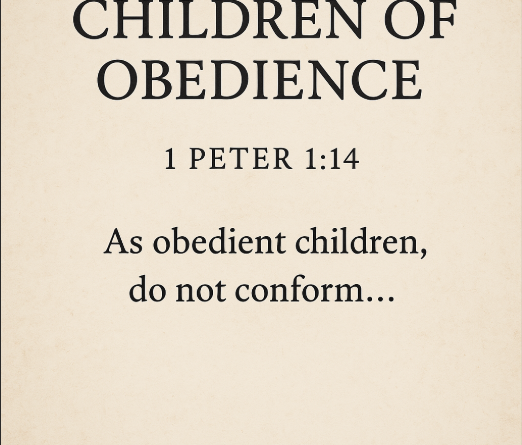The Rewards Of Obedience: Experiencing God’s Blessings
Obedience feels like a small, everyday thing — a decision to follow, to listen, to do the next right step. Yet when you start paying attention to the biblical pattern, you discover a powerful truth: the rewards of obedience are not just spiritual buzzwords; they’re tangible blessings that shape your relationship with God and the way your life unfolds. This article invites you into a conversational exploration of why obedience matters, how it works, what it costs, and what you can expect when you choose to walk in God’s ways. You’ll find encouragement, solid teaching, practical steps, and scriptural anchors so you can experience the rewards of obedience for yourself.
What obedience really means for you
Obedience isn’t just following rules. In Scripture, obedience is the natural response of a heart that knows God — it’s trust expressed in action. When you obey, you’re saying, “I believe God knows what’s best for me,” and you put that belief into practice. That posture produces spiritual growth, relational restoration, and often unexpected provision. As Jesus put it plainly: “If you love me, keep my commands.” See John 14:15 for the direct connection between love and obedience. The rewards of obedience begin with a heart orientation: you’re choosing partnership with God, not independence from him.
The biblical foundation for the rewards of obedience
Scripture is full of examples and promises that connect obedience with blessing. From the earliest stories to the apostolic letters, the Bible shows a consistent pattern: obedience invites God’s favor and presence into your life. Consider the call to Abraham and the covenant promises linked to his faithful response — obedience set the stage for blessing across generations. For a snapshot of God rewarding faithful action, reflect on the story of Noah following God’s instructions to build the ark, which preserved his family and fulfilled God’s plan (see Genesis 6:22). Your obedience does more than please God; it positions you within his purposes.
Old Testament illustrations of reward and responsibility
The Old Testament makes it clear that obedience brings blessing and disobedience brings consequences. Deuteronomy lays out blessings tied to hearing and obeying God’s voice. The promise is simple and sweeping: if you fully obey the Lord, blessings will follow in your life. Read the direct promise in Deuteronomy 28:1-2. Those rewards aren’t merely financial or circumstantial; they include peace, community flourishing, and spiritual fruit. When you obey God’s commands, you’re aligning with the covenant life that God designed for flourishing.
New Testament clarity about the rewards of obedience
Jesus and the New Testament writers emphasize that obedience flows from relationship, not legalism. Jesus ties obedience to love, and he promises intimacy to those who follow him. The rewards of obedience in the New Testament are both present and eternal: deeper fellowship with Christ, joy, assurance, and a stake in God’s kingdom work. Hebrews highlights how Jesus learned obedience through suffering and became the source of eternal salvation for those who obey him (see Hebrews 5:8-9). When you obey, you participate in redemption — your life becomes part of God’s ongoing rescue mission.
Spiritual rewards you can expect
Obedience yields spiritual rewards that transform your inner life. You’ll find increased peace, a clearer conscience, a deeper sense of God’s presence, and growth in Christlike character. The Psalms often connect blessing with the path of the righteous; for instance, the person who delights in God’s ways is like a tree planted by streams of water, flourishing in season (see Psalm 1:1-3). When you obey, you’re not earning God’s love — you’re cooperating with the process that produces holiness, fruitfulness, and spiritual maturity.
Practical rewards: provision, protection, and favor
Beyond the internal blessings, obedience often produces practical rewards you can see. God’s care for his people frequently shows up as provision, direction, and protection. Proverbs and other wisdom literature link wise living with stability and security. Trusting God and following his counsel opens doors and provides clarity; Proverbs instructs you to trust the Lord, and in doing so, you’ll find guidance for your paths (see Proverbs 3:5-6). Likewise, Jesus taught that seeking God’s kingdom first brings provision for your life (see Matthew 6:33). The rewards of obedience are not automatic formulas, but they are real patterns God uses to care for his people.
Examples of obedience rewarded in Scripture
You don’t have to look far to find stories of people who obeyed and saw God reward them. Abraham’s willingness to trust God brought covenant blessings (see Genesis 22:15-18). Hannah’s faithful prayer and obedience led to the gift of Samuel, who became a prophet and judge for Israel (see 1 Samuel 1:27-28). The recurring pattern is this: obedience opens the door for God to do what only he can do. Those rewards often extend beyond your own life and into future generations.
The cost and reality: obedience doesn’t always mean ease
You need to understand that obedience is not a promise of a trouble-free life. Often, obedience will lead you into trials because following God sometimes runs counter to culture, convenience, or personal desires. Think of the apostles who faced persecution for obeying the Lord rather than human authorities — they obeyed God and were sometimes jailed or beaten (see Acts 5:29). The rewards of obedience are real, but they can coexist with hardship. Hebrews reminds you that God disciplines those he loves — discipline is not rejection but part of a loving relationship that produces holiness (see Hebrews 12:6). Your willingness to obey amid difficulty often deepens your faith and prepares you for greater fruit.
Obedience and trials: how they work together
Trials don’t negate blessings; they often refine the character that makes blessings sustainable. James tells you to consider it pure joy when you face trials because they produce perseverance, which leads to maturity (see James 1:2-4). Obedience during hard seasons trains you to rely on God’s strength rather than your own comfort. The rewards of obedience in these moments may be quieter, steadier faith, deeper trust, and a testimony that helps others.

Eternal rewards: a perspective that changes decisions today
When you obey, you’re not only reaping benefits for today; you’re investing in eternity. Jesus challenged his followers to store up treasures in heaven rather than obsess over temporary wealth (see Matthew 6:19-21). Revelation echoes that Jesus will return with rewards for those who remain faithful (see Revelation 22:12). The rewards of obedience include an eternal dimension — the assurance that your faithful choices have lasting significance in God’s economy.
Obedience and grace: how they fit together
You may wonder if emphasizing obedience suggests earning salvation by works. Scripture is clear: salvation is a gift received by faith, not a wage earned by performance (see Ephesians 2:8-9). Yet the Bible also teaches that you were created for good works and that obedience flows out of the new life you’ve been given (see Ephesians 2:10). The rewards of obedience are not a transactional substitute for God’s grace; they are the fruit that naturally grows from a heart transformed by grace. When you understand this, obedience becomes an act of gratitude rather than a checklist.
How to cultivate a lifestyle that experiences the rewards of obedience
If you want to experience the rewards of obedience, build habits that make following God natural. Scripture reading, prayer, community, accountability, and small-step obedience matter. James urges you to be doers of the word, not merely hearers (see James 1:22). Practical steps include setting aside daily time for Scripture (2 Timothy explains how Scripture equips you for every good work — see 2 Timothy 3:16-17), memorizing verses that speak to obedience and faith, and asking a friend to help you stay accountable. The rewards of obedience grow out of consistent, ordinary faithfulness.
Simple practices to grow in obedience
You don’t need dramatic spiritual experiences to obey. Small, regular practices form the muscle of obedience. Start with these simple rhythms and watch how they compound:
- Read a short passage of Scripture each morning and ask, “What is God asking me to do today?”
- Pray for the willingness to obey and for the courage to act.
- Choose one area where you want to be obedient (generosity, honesty, service) and take one concrete step this week.
- Join a community where you can be encouraged and corrected in love.
These small exercises help you notice the rewards of obedience — increased clarity, peace, and a sense of God’s presence — as you respond to his voice.
Overcoming common obstacles to obedience
Fear, pride, busyness, and confusion often stand between you and obedient living. The Bible gives both diagnosis and remedy. When you’re overwhelmed by fear, remember God’s invitation to be still and know him (see Psalm 46:10). When you struggle with weakness or inadequacy, Paul’s assurance that Christ strengthens you can be your anchor (see Philippians 4:13). When Scripture feels foreign, invite the Holy Spirit to make it alive to you; Hebrews reminds you of the power of God’s word to discern hearts (see Hebrews 4:12). The rewards of obedience become accessible when you address these practical barriers with prayer and community.
How to discern God’s specific instructions
You’ll sometimes need help discerning whether a prompt is from God or your own desires. Scriptures like Psalm 119 remind you that God’s word is a lamp to your feet and a light to your path (see Psalm 119:105). Use the Bible as the primary filter for decisions: if a choice contradicts Scripture, it’s not from God. Also seek godly counsel, test the fruit of the decision, and take small steps of obedience to see if doors open or close. Discerning God’s voice becomes easier the more you practice obedience; the rewards of obedience include increased discernment and clarity.
The role of community in sustaining obedience
You weren’t meant to pursue obedience in isolation. The New Testament consistently connects obedience with faith lived out in community. Accountability, encouragement, correction, and shared prayer help you stay the course. When you’re part of a community that values obedience and love, the rewards of obedience multiply: lives are encouraged, sin is exposed and healed, and people experience God’s blessing together. The early church model demonstrates how mutual support enabled courageous obedience even under persecution (see Acts 2:42-47).
Real-life examples: contemporary and biblical
You might be inspired by biblical examples, but contemporary stories matter too. Ordinary believers who choose to obey in difficult circumstances often report unexpected provision, reconciled relationships, and opportunities to serve. The biblical narrative provides the template: Hannah obeyed God with prayer and trust and was rewarded with Samuel (see 1 Samuel 1:27-28). The rewards of obedience often show up as restored relationships, new callings, and a deeper sense of God’s faithfulness.
Holding both tension and hope: obedience in an imperfect world
You’ll sometimes obey and still face suffering or unanswered questions. That tension doesn’t nullify the rewards of obedience; it reframes them. God promises his presence, character growth, and ultimate vindication for those who remain faithful. The Christian life is shaped by both present faithfulness and future hope — a hope that anchors you when present rewards are delayed or hidden. Scripture encourages endurance and trust in God’s timing (see Romans 8:28). When you embrace both the immediate and eternal aspects of the rewards of obedience, you live with resilience and peace.
Frequently asked questions about obedience and reward
You might have questions: Is obedience required for salvation? Will God always reward obedience materially? How do you know if you’re obeying correctly? The short answers are: salvation is by grace through faith (see Ephesians 2:8-9), rewards aren’t always material and may be spiritual or eternal (see Matthew 6:19-21), and obedience is tested by Scripture, community, and the fruit it produces (see James 1:22). The rewards of obedience aren’t always immediate or obvious, but they are real and consistent with God’s character.
Putting it into practice: a 30-day obedience challenge
If you want to cultivate obedience, try a focused 30-day challenge. Pick one area — generosity, prayer, Scripture, or serving — and do one consistent action every day. Pair the practice with a verse to memorize and pray each morning. At the end of 30 days, reflect on how you’re different and what blessings you noticed. Small, steady obedience often unlocks larger doors—the rewards of obedience compound when you persist.
Final encouragement: the heart behind the act
Above all, keep your heart oriented toward God’s love. Obedience isn’t about performance; it’s about relationship. When your obedience springs from love, it reflects the transformation God is working in you. Jesus said the one who follows him will be blessed in spiritual ways that money can’t buy — a close walk with God, joy in trials, and a confidence that your life matters for eternity (see John 14:15 and Matthew 6:33). The rewards of obedience are as much about who you become as what you receive.
Conclusion: Start small, expect God
You don’t have to overhaul your life to begin experiencing the rewards of obedience. Start with one faithful step today — a prayer, a confession, a generous act, a moment of truthfulness — and watch how God meets your willingness with his grace. Obedience invites God’s presence, protection, and provision into ordinary life. It may require courage, but it repays you with intimacy, character, and lasting significance.
Explore More
For further reading and encouragement, check out these posts:
👉 7 Bible Verses About Faith in Hard Times
👉 Job’s Faith: What We Can Learn From His Trials
👉 How To Trust God When Everything Falls Apart
👉 Why God Allows Suffering – A Biblical Perspective
👉 Faith Over Fear: How To Stand Strong In Uncertain Seasons
👉 How To Encourage Someone Struggling With Their Faith
👉 5 Prayers for Strength When You’re Feeling Weak

📘 Jesus and the Woman Caught in Adultery – Grace and Mercy Over Judgement
A powerful retelling of John 8:1-11. This book brings to life the depth of forgiveness, mercy, and God’s unwavering love.
👉 Check it now on Amazon 🛒💥
🔥 “Every great message deserves a home online.” 🌍💬🏡
Don’t let your calling stay hidden. Start a Christian blog or website using Hostinger — with 99.9% uptime, a free domain, and SSL, your voice can shine for God’s glory anytime, anywhere.
💥 Begin today. 🛒 Try it RISK-FREE! ✅
✝️ “Your body is God’s temple — care for it with purpose.” 💪💖🏛️
Renew your energy and restore balance naturally. Mitolyn helps support a healthy metabolism, giving you the vitality to live out God’s calling with strength and confidence.
🔥 Unlock Your Metabolic Power! ⚡Burn More Calories & Feel Great With Mitolyn. 💪
👉 Start Today. 🚀 Check Price Now. 🛒💰
💰 As a ClickBank & Amazon Affiliate, I earn from qualifying purchases.
📖 Acknowledgment: All Bible verses referenced in this article were accessed via Bible Gateway (or Bible Hub).
🚀 Want to explore more? 👉 Dive into our new post on Why Jesus? and experience the 🔥 life-changing truth of the Gospel!








